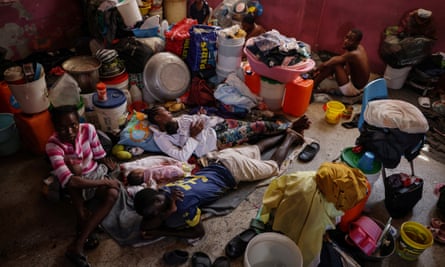Half of all Haitians are struggling every day to find food as rampant gang violence and lawlessness are causing “the worst hunger emergency in the western hemisphere”, a report has found.
The UN World Food Programme (WFP) and its partner organisations estimate that 5.4 million Haitians are now regularly finding it hard to get enough to eat, a record for the Caribbean nation and the largest proportion of acutely food insecure people anywhere in the world, WFP said. The figure suggests another 600,000 people have fallen into “crisis” level hunger since the previous peaks recorded earlier this year and in 2023.
A coalition of 12 leading aid agencies has called for immediate action to alleviate the escalating hunger crisis as gang control of major roads blocks food supplies and causes huge price rises.
“Without immediate action the hunger crisis in Haiti will continue to deepen, with devastating consequences for millions of vulnerable people,” civil society groups in Port-au-Prince, including Action Against Hunger, Save the Children and Mercy Corps warned in an open letter.
Ten years ago only 2% of Haiti’s population was food insecure but the country was plunged into chaos when its president Jovenel Moïse was assassinated in 2021 and gangs have since seized control of more than 80% of the capital.
An explosion of gang violence earlier this year – which forced Haiti’s interim leader Ariel Henry to step down – brought shipping and airport operations to a halt, blocking food getting into the import-dependent country.
The added cost of gang tolls on major roads combined with inflation and ever deepening poverty means food now accounts for up to 70% of total household expenditure, the 12 NGOs said.
Supplies from southern Haiti, a key region for food distribution, have been blocked for months, said Angeline Annesteus, president of Cadre de Liaison Inter-Organisations (Clio), an association of 80 Haitian and foreign NGOs.
“While markets may still have food, violence and inflation have driven prices out of reach for millions,” Annesteus said. “What we’re witnessing in Haiti isn’t a food shortage – it’s a full-blown hunger crisis.”
Two million Haitians are now at “emergency” hunger levels, WFP said, which is one step away from famine.

Aid groups say heads of families are regularly having to choose whether to feed themselves or their children and that they are particularly concerned about the growing number of displaced people who are at the highest risk of malnutrition and the diseases coursing through refugee camps. About 6,000 Haitians are at risk of death from starvation, the report found.
The number of people displaced has nearly doubled to more than 700,000 in the past six months, with some seeking shelter in schools and public buildings. Women and girls are being forced to offer sex for food.
Aid groups are desperately trying to support millions in need but humanitarian food agencies and NGOs in Haiti are $230m (£173m) short of funding.
“We must not turn our backs on the worst hunger emergency in the western hemisphere. WFP is urgently calling for broad-based support to massively increase life-saving assistance to families struggling every day with extreme food shortages, spiralling malnutrition and deadly diseases,” said WFP’s executive director Cindy McCain.
Kenya deployed 400 police officers to Haiti in June as part of a UN-backed security mission intended to tackle the gangs but that mission has stalled as countries have not provided the estimated $600m (£450m) required.
The UN security council voted unanimously on Monday to extend the mission for another year but a plan from the US and Ecuador to make it an official UN peacekeeping force, allowing them to tap the organisation’s international funding, was shelved because of opposition from China and Russia.
In the first half of 2024, 3,661 people have been killed in the violence, the UN office of the high commissioner for human rights said last week.
